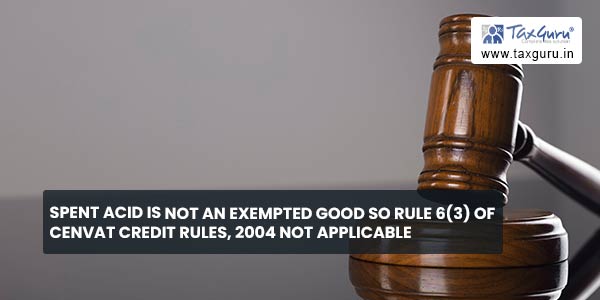Case Law Details
M/s IPF Vikram Sulphonation Limited Vs Commissioner of CGST, Central Excise (CESTAT Delhi)
The case of the Revenue is that the Spent Acid is an exempted goods, therefore, they are liable to pay an amount of equivalent 6% of the value of such Spent Acid in terms of Rule 6(3) of the CENVAT Credit Rules, 2004.
The facts of the case are not in dispute that the appellant is a manufacturer of Sulphonic Acid and during the course of the manufacturing of Sulphonic Acid, Spent Acid emerges. As the Spent Acid is not an exempted good, therefore, the provisions of Rule 6(3) of CENVAT Credit Rules, 2004 are not applicable to the facts of the case as held by this Tribunal in the case of Dharamsi Morarji Chemicals Co. Ltd. vs. Commissioner of C. Ex. Raigad, 2010 (255) ELT 314 (Tri.-Mum). Therefore, the demand against the appellant is not sustainable, accordingly, the same is not sustainable.
FULL TEXT OF THE CESTAT DELHI ORDER
1. The appellant is in appeal against the impugned order wherein an amount equal to 6% of the value of the goods cleared by them is demanded as exempted goods.

2. The facts of the case are that the appellant is engaged in the manufacture of Sulphonic Acid. During the course of the manufacturing of the final product, some Spent Acid emerges on which the appellant has cleared without payment of duty. The case of the Revenue is that the Spent Acid is an exempted goods, therefore, they are liable to pay an amount of equivalent 6% of the value of such Spent Acid in terms of Rule 6(3) of the CENVAT Credit Rules, 2004. In view of this, a show cause notice was issued to the appellant which was adjudicated wherein the demand for the period prior to 1st March, 2015 was dropped and the rest of the demand is confirmed along with interest and penalty was also imposed. Against the said order, the appellant is before me.
3. The Learned Counsel for the appellant submits that as Spent Acid emerges during the course of the manufacturing of the final product is neither exempted good nor having nil rate of duty. Therefore, the provisions of Rule 6(3) of CENVAT Credit Rules, 2004 are not applicable to the facts of the case. To support the contention learned counsel has relied on the decisions of the Tribunal on Aureola Chemicals Ltd. vs. Commissioner of Central Excise, Indore, 2004 (175) ELT 148 (Tri.-Del.) and Dharamsi Morarji Chemicals Co. Ltd. vs. Commissioner of C. Ex. Raigad, 2010 (255) ELT 314 (Tri.-Mum)
4. Learned Authorised Representative supported the impugned order.
5. Heard the parties considered the submissions.
6. The facts of the case are not in dispute that the appellant is a manufacturer of Sulphonic Acid and during the course of the manufacturing of Sulphonic Acid, Spent Acid emerges. As the Spent Acid is not an exempted good, therefore, the provisions of Rule 6(3) of CENVAT Credit Rules, 2004 are not applicable to the facts of the case as held by this Tribunal in the case of Dharamasi Morarji Chemicals Co. Ltd. (supra). Therefore, the demand against the appellant is not sustainable, accordingly, the same is not sustainable.
7. In result, by setting aside the impugned order, the appeal is allowed with consequential relief, if any.
(Order dictated and pronounced in open court)




